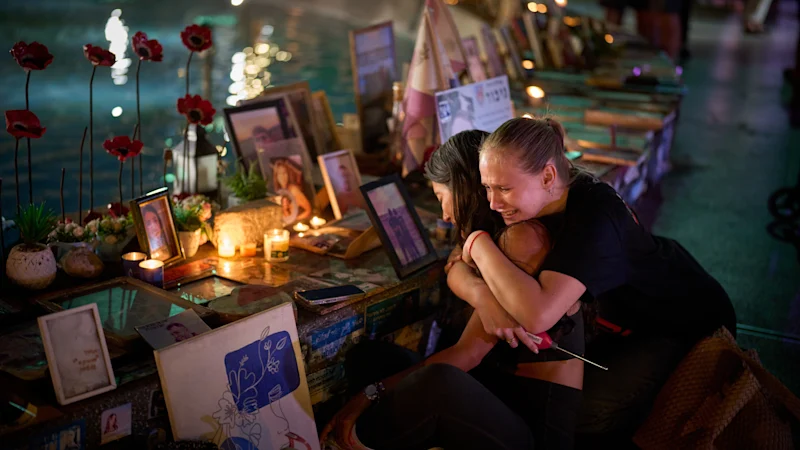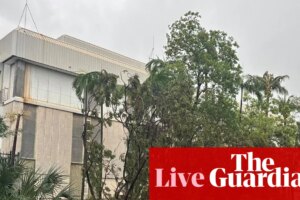
Normal text sizeLarger text sizeVery large text size
Kfar Aza, Israel: Displaced residents of this farming community gathered before the sun rose on Tuesday to honour relatives killed two years ago here in the Hamas-led attacks, to reflect on what has since become of Israel, to commemorate a terrible day in rituals marred by the irrepressible sounds of war.
Sirens, at one point, warned of another attack – at least one of them a false alarm. Another siren marked the anniversary of the day when about 1200 people were killed during the cross-border assault.
And throughout the morning, there were the booms and thuds of artillery and airstrikes landing a few miles away in Gaza, its brutalised residents desperate for it all to stop.
This year, Israel’s government elected not to hold a state ceremony on October 7, because it coincided with the Jewish holiday of Sukkot. But many gathered anyhow, in the border communities that were attacked, and in the squares in Israeli cities that have become sites of solidarity and protest against Prime Minister Benjamin Netanyahu for his failure to end the war and free hostages held by Hamas.
People attend a memorial service in Kibbutz Kfar Aza, where many community members were killed and abducted in the 2023 Hamas attack.Credit: AP
If Tuesday’s anniversary offered a clarion call, it was this: people on both sides of the border, in Israel and Gaza, saying enough was enough.
“Two years of war is something terrible, terrible, terrible,” said Pnina Russo, whose son Uri, an engineer, was killed while defending Kfar Aza during the attack in 2023.
Yareen Abu Naja, 44, who spent Tuesday as she did every day in Gaza, scrambling for food for her family, said, “enough of this injustice and indignity … enough of this war”, her voice cracking.
The last two years in Gaza – with tens of thousands of people killed during the Israeli military campaign, and entire neighbourhoods levelled – had passed “as if they are 100 years,” Abu Naja said.
The backdrop to Tuesday’s commemorations are negotiations to end the war in Gaza, under way in Egypt.
In Israel, Netanyahu faces pressure from opposing sides: Most Israelis would like to end the war, according to recent polls, and protesters regularly march to call for a hostage deal, while far-right members of his governing coalition have threatened to bring down the government if Israel agrees to a peace deal.
Netanyahu is also facing a reckoning from abroad, as Israel grows more isolated. The country’s allies and neighbours are pushing for the kind of permanent resolution to the Israeli-Palestinian conflict – a pathway toward a Palestinian state – that Netanyahu has opposed. And a growing number of academics and human rights organisations say Israel’s military campaign in Gaza meets the legal definition of genocide, adding to pressure for its immediate end.
Hamas, in recent days, said it would accept US President Donald Trump’s 20-point peace plan and release all Israeli hostages it was holding, subject to conditions and further talks.
In Kfar Aza, once a town of 400 people and among the closest to the Gaza border, Russo remembered her son Uri as beautiful, smart – “really, a wonderful person.”
“I miss him very much,” she said.
But she was heartbroken, too, at the continuation of the war, not just the fighting in Gaza, but at the divisions in her own country over the conflict – the “situation between the people,” Russo said. “It has to change.”
“I think about the children in Gaza; they are inside all this mess,” she said. “Really, it’s hard for the mother in us.”
Smoke rises after an Israeli air strike in Gaza – not far from Kibbutz Kfar Aza – on Tuesday.Credit: Bloomberg
She did not know whether to place her faith in Trump. He was “not the person” to trust with peace, but on the other hand, Trump had the power to move Netanyahu, who has frequently indicated his preference for continuing the war.
“You have to be optimistic,” Russo said. “To continue to believe it will change.”
In Hostages Square in Tel Aviv on Tuesday, Rotem Cooper, 59, signalled hope in the negotiations taking place in Egypt’s Sharm el-Sheikh, with reservations.
His parents, Nurit and Amiram, were taken from Kibbutz Nir Oz in the October 2023 attack. Nurit, his mother, was released after 17 days; Israel’s army said in June 2024 that Amiram had been killed in captivity.
“We’ve been in that road of false hope, many times,” Rotem said. “I’m trying to be very careful to raise hopes again, although it is looking more promising,” he added, saying that he was “appreciative” of Trump’s ceasefire efforts.
A woman walks through memorial of the slain and kidnapped at the site of the Nova Festival in Israel.Credit: Getty Images
His own government was not “exactly interested, or at least there is an element in the government, including the prime minister, that is not truly interested, in the release of the hostages,” he said. “They prefer to continue the war, and having the hostages there is a great reason to continue the war.”
In Dizengoff Square, another memorial site about half a mile away, Naama Lazimi, an opposition member of parliament and one of the government’s most outspoken critics, said the fact that the hostages had not yet been released – and that there had been no government commission of inquiry into the October 7 attack – was a “moral disgrace for the state, for a society”.
Regarding the negotiations to end the war, “people here are full of hope.” But the government’s priority was “political survival, and it will do everything to sabotage the deal”, she said.
“The Trump administration is working to bring Israeli citizens back to recovery and for burial, while the Israeli government is working to sabotage it. It’s a sick situation that harms us as a society and as a nation,” she said.
For Iman Al- Ijla, 23, who was staying with family friends west of Gaza City during an Israeli military offensive there, October 7 was a “painful and heartbreaking memory”.
Loading
“We’ve been displaced for two years now and constantly on the move every single day, with no electricity, no internet and no real sense of normal life all this time.” Life had been “long days and longer nights”, she said.
Dozens of her family members and friends had been killed over the past two years. They included 20 relatives killed in an Israeli airstrike on their home in southern Gaza in the summer of 2024. “They were innocent people, with no connection to the resistance,” she said. “Still, I’m holding on to hope about the talks in Egypt this time.”
“This has to end. Enough is enough.”
Yamen Adwan, 26, who is living in a displacement camp in Khan Younis, said there was nothing left of his old life after two years of war. Israeli forces destroyed his home in the city of Rafah. He lost his job as a nurse as the health care system collapsed. Three of his closest friends have been killed.
He lives with seven family members in a tent. They rely on donated water and food from soup kitchens. He used to go to a site run by the Israeli-backed Gaza Humanitarian Foundation to fight for food but stopped a month and a half ago after being injured by shrapnel.
“My life is hell,” he said in a message on WhatsApp. “The future is lost, love is lost, life is lost, our dreams are lost. I feel nostalgic for home, for my memories before the war, for my friends who all died, and for the streets of my city.”
A photo of a Kibbutz Kfar Aza resident who was killed during the 2023 attack.Credit: Getty Images
Across the border, as night fell on Monday, the eve of the October 7 anniversary, Alex Tavgen Goldman, 51, and his wife Natalie, 48, arrived to tend to the memorial site of their daughter, Katerina Tavgen Goldman, who was killed at the Nova music festival, one of the first targets of the Hamas militants as they launched their cross-border attack. Outgoing artillery fire shook the place.
“It feels like a giant cemetery here; the ground is soaked with blood,” Alex said. Natalie knelt on the ground by a tree they planted two years ago, a sapling now about 1.5m tall, its roots plunging deeper into the soil every day of the war.
Their daughter’s photograph was framed on a metal stake, among a small forest of others who were killed on October 7.
“There’s nothing to say, it’s hard,” Natalie said. “Two years – the time went by quickly.”
“The heart hurts.”
Washington Post
Get a note directly from our foreign correspondents on what’s making headlines around the world. Sign up for our weekly What in the World newsletter.





